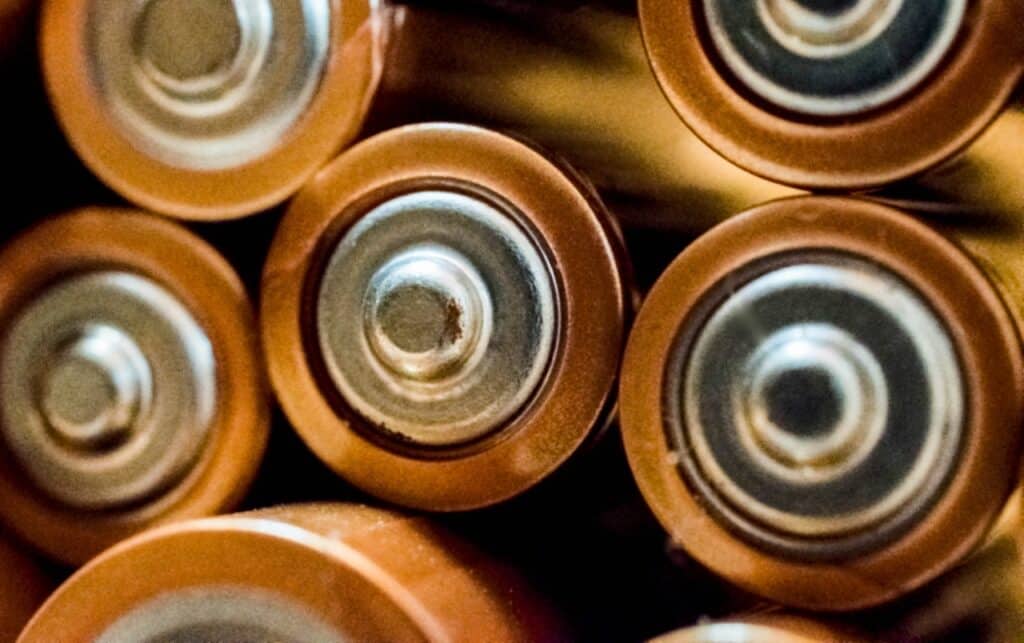In an electronic world, there’s no doubt that we all have more batteries in our homes than we can probably count. We’ve already examined the risks posed by lithium-ion batteries and car batteries on this site, but we’ve not looked at ordinary household alkaline batteries, yet. With so many of them in our lives, do they represent a fire hazard, and should we be taking more precautions with them?
An ordinary alkaline battery in normal use in your home is unlikely to catch fire spontaneously. However, if a battery is kept in a device for too long, it may leak the contents and this could potentially start a fire. You might also short circuit a loose battery to cause a fire.
There are some safety concerns when it comes to batteries and fire. Here’s what you need to know.
Your # 1 priority is keeping your family safe. As a firefighter, I recommend everyone has updated smoke detectors that don’t require battery changes, like these ones from Kidde, a fire extinguisher, like this one from Amerex, and a fire escape ladder if you have bedrooms above the first floor, I recommend this one from Hausse.
Also read: Is Lithium Flammable? Battery Explosions
What Are Batteries?

For the purpose of this article, we are considering alkaline batteries and standard rechargeable batteries of those commonly used in household appliances.
A battery is, of course, a store of electrical power that can be released by triggering an electrochemical reaction within the cell (or cells) inside.
Alkaline batteries rely on the reaction between zinc and magnesium dioxide to drive the flow of electrons and they are “alkaline” because they contain Potassium Hydroxide which is an alkali, in contrast to other batteries which tend to contain acid solutions.
If you have A, AA, C, AAA, N, PP3, etc. batteries in your home, they are going to be alkaline batteries. These batteries account for about 80% of all the batteries manufactured each year around the world and account for over 10 billion sales annually!
They are gradually being phased out in many countries to be replaced by a rechargeable version that looks similar and function identically but which have a cell in which the reaction can be reversed.
The earliest alkaline batteries appeared in 1899 and were invented by Waldemar Jungner, they would be invented independently (again) two years later by Thomas Edison.
The current versions, however, are based around a design by Lewis Urry a Canadian Engineer who was working for Union Carbide when he filed a patent for alkaline batteries which was confirmed in 1960.
One big change in these batteries in the interim years has been a drive to eliminate the metal mercury from their manufacture and to do this, they now require much purer Zinc than they once did.
Can Batteries Cause A Fire?
Technically, yes. Even the smallest voltage batteries such as a AAA battery can, given the right circumstances, start a fire.
However, in normal use or when stored in their original packaging, this is unlikely.
In order to start a fire, these batteries must be short-circuited, that is the negative and positive terminals on the battery touch the same metal object (or a series of metal objects such as coins in a pocket). This starts to draw electric energy through the circuit which as it is not required to drive any electrical item – manifests as heat.
Leave this short circuit in place for long enough? The battery gets so hot that it will set fire to things around it and, in turn, those things will set fire to your battery.
That means if you want to avoid your batteries catching fire – you should store them properly if they are not in a device.
If they come with a plastic cap on the end, keep it on. If they are in original packaging, keep them in that. If you have loose batteries, tape over the contacts on each end until you need them.
Store batteries in an orderly fashion lined up side by side so that contacts don’t touch, never throw them in a container haphazardly.
You can see how his is done here:
Also read: The Best Fire Extinguisher for Lithium-Ion Batteries – 2022
What Causes Batteries To Catch Fire?
As we’ve already noted, it’s a short circuit that causes a battery to catch fire.
You can avoid short circuits by storing your batteries properly as outlined above.
What Happens When Batteries Get Hot?
Heat will damage the lifespan of your batteries in the first instance. If they are in use, they will work harder to produce a similar current – and this reduces their longevity.
However, here we mean heat that is in reasonable excess of normal room temperature.
If batteries are allowed to get too hot then worse can happen – they will malfunction completely, they may start to bulge at the seams, the surface might bubble and they could even start sparking, catch fire and explode!
Take a look at this video:
How Hot Can A Battery Get Before It Explodes?
A battery will only explode if it gets hot enough inside the battery to ensure that the contents expand so much that they rip through the battery casing.
This tends to happen at a temperature of around 500 degrees Celsius, 1000 degrees Fahrenheit – sometimes the cell may simply burst into flame if there is a leak in the cell to allow contact between the electrodes and the outside air.
Also read: Can Static Electricity Start A Fire?
What Happens When A Battery Explodes?
Some people term a battery “exploding” as the battery leaking within the device that is being used. This can happen when the battery is left in a device for a long period of time rarely drawing current.
It’s not good news for the interior of the device, mind you, because the battery will leak potassium hydroxide onto the circuitry and terminals of the battery compartment and as this is corrosive, it will eat through the metal.
If you find that this has happened, you should clean it off with a cloth but do not touch the solution with your bare hands.
If a battery explodes in the more standard understanding of “explodes” – the chemical vapors inside expand enough to rip the casing to shreds. This is pretty much exactly how a grenade works – and while a battery doesn’t produce as much shrapnel or shrapnel as heavy as that from a grenade, it’s still not a desirable outcome.
Worse, once the shrapnel has done its worst, the potassium hydroxide inside will be sprayed all over the place as this is highly corrosive it can cause burns to you and damage to anything else it lands on.
Also read: How Hot Is Lightning? Hotter Than The Sun?
Can AA Batteries Explode?
Yes. All batteries can explode if they get hot enough, AA batteries are no exception.
Can Batteries Explode In The Cold?
An alkaline battery is not likely to explode in the same way in the cold as it does in the heat. It is possible for an alkaline battery’s contents to expand when frozen (in the same way water freezing expands to form ice) and if this happens it may crack the casing on the battery.
If this happens you should throw the battery out using appropriate local disposal methods to avoid contaminating your garbage with potassium hydroxide.
What Happens If You Puncture a AA Battery?
If a battery is punctured there is a very small chance that it might explode if the contents ignite with the spark created, however, this is unlikely.
What is more likely is that the potassium hydroxide inside will leak out of the interior and present a corrosion hazard. Leaking batteries should be disposed of safely and any fluid should be mopped up without touching it.
Are AA Batteries Poisonous?
While not poisonous to the touch, it’s worth noting that your average AA cell contains a load of toxic heavy metals and the interior is full of highly corrosive potassium hydroxide.
That means it would be an incredibly bad idea to eat or swallow a battery and if you were to do so, it would be imperative to seek medical treatment immediately. There is a substantial risk of severe damage to your gastrointestinal tract.
What Happens If A Child Swallows A Battery?
Exactly the same as if adults do, children should not be allowed to chew on batteries as there is a risk that they might leak and cause burns to the mouth, throat, face, etc.
If a child licks a leaking battery that has had white crystals form on it, you must call your local poison center immediately.
And if they swallow one, it requires an immediate trip to the hospital.
Sources: 1 2 3 4 5 6 7 8 9 10 11 12 13 14
Related Articles
Do Fire Extinguishers Expire? How Long Do They Last?

